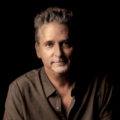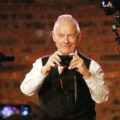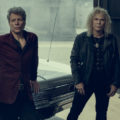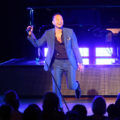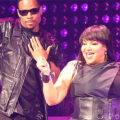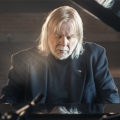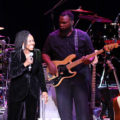King Crimson gears up for golden anniversary with reflections from ace bassist Tony Levin
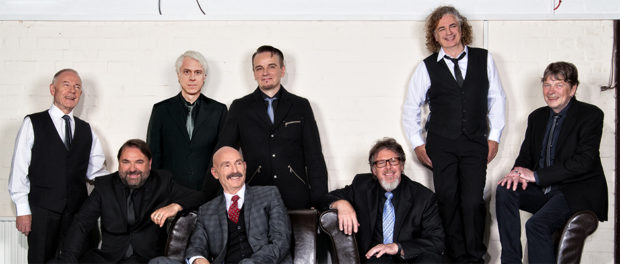 Photo provided by Glass Onyon PR
Photo provided by Glass Onyon PR
The virtuoso players and their experimental soundscapes may have regularly shifted, but innovation and progression remain key principles in King Crimson 50 years after forming in London. Nowadays, the traveling edition of the band is comprised of forever leader Robert Fripp, along with long timers Mel Collins, Tony Levin and Pat Mastelotto, plus recent additions by comparison Gavin Harrison, Jakko Jakszyk and Jeremy Stacey. In spite of their varying eras, this immensely esteemed supergroup is slated to select integral moments from all five decades at the Auditorium Theatre on Tuesday, September 10. Prior to the milestone performance, Chicago Concert Reviews linked up with Levin to tackle tons of related King Crimson subjects, a bit about his other boss Peter Gabriel and additional musical activities occupying the ace bassist.
Congrats on King Crimson’s 50th anniversary! Which elements do you feel have contributed to the group lasting so long?
Tony Levin: Well, I’m a newcomer to the band…only been in it 38 years…so factor that into my answers! Really, Robert is the only constant in all the Crimson lineups, as all the fans know. There has been a wide range of great players in the band, but he’s the constant, and in my opinion, it’s his musical vision that directs the band, though he can be pretty subtle about nudging us in the direction he thinks will work.
 What’s been the most surprising part of the entire ride thus far?
What’s been the most surprising part of the entire ride thus far?
Levin: Lots of surprises in this band, even musical ones on stage many nights! I can’t think of a surprise that concerns the life of the band, probably because in this rock world I don’t pretend to know what’s going to happen with any band or record release. But one thing that comes to mind is that this incarnation of the band has three drummers, and as a bassist, I had some trepidation about what that might mean for my playing, my finding parts, and finding good grooves for the material. Turned out, as often in Crimson, that it was a better idea than I’d thought, though a ground breaking one. Robert had chosen the right musicians to accomplish the idea. It became a new challenge to fit in with the drum strategies and find new musical techniques and sounds.
Give us a sneak preview of what to expect from the tour.
Levin: We have a great amount of Crimson material now that we can choose among. Typically, we’ll do a three-hour show, with intermission, so the audience can expect to hear a lot of music. Some of it quite challenging, some familiar, and quite a bit is fun…Even some laughs at the way the drummers can interact during some of their solos. The three drummers are spread across the front of the stage, with the other four of us on risers behind them. We wear suits, or close to it, so there are a few ways it resonates like a classical concert. Oh, and like a classical performance, we ask the audience not to take pictures or videos until the end of the show, and that’s turned out to improve the experience for the many non-photographers who, as we all know, have their show compromised when the person in front of them uses their cellphone. People say that we’re surprisingly tight for a large band, and if so, that’s because we rehearse a lot. Though the performances aren’t perfect, all those hours and the months of touring do help us gel as a band.

Photo provided by Scarlet Page
Levin: I’ve played Chicago many times…Wait a minute, I’ll consult my database…I’ve entered my old itineraries into it just so I can get some idea where I’ve been! I see 36 shows I have listed, including with Peter Gabriel, Stick Men, Liquid Tension Experiment, Bruford Levin Upper Extremities, Peter Frampton, Richie Sambora, California Guitar Trio, and of course, quite a few with King Crimson. The Chicago audiences are, well, you know it, sophisticated, enthusiastic, boisterous, and know what they like. So, of course, it’s a pleasure to play Chicago, whether in Reggies, or Martyrs’, or in a big venue.
Out of all the albums you’ve recorded with the group, what’s your favorite and why?
Levin: No favorites, for albums I’ve played, or albums in general. I feel that a lot of music is very special and inspiring to me. I’ve no desire to compare things and put them in order of how important. In addition, I have to say that I have very little time to go back and listen to music I’ve recorded, even recently. Most of my time is spent preparing to play the music that’s in my future.
How would you describe your fan base nowadays?
Levin: I think a band gets the fans it deserves, and Crimson, never having tried to be predictable or have a pop record, always trying to be creative and fresh, has a wonderful base of fans who appreciate the complexity of what we do, who are open to be surprised at the concerts, and who are very kind in supporting the band.
Outside of King Crimson, what’s going on in your musical life at the moment or on the horizon?
Levin: I tour with Stick Men, a progressive rock trio including Pat Mastelotto, of King Crimson, and touch guitar player Markus Reuter. I also tour, when time allows, with my brother Pete, in a jazz quartet we call Levin Brothers.

Photo provided by Dean Stocking
Levin: I saw Peter recently, and no talk came up about touring. He’s slowly working on an album of new material. Like the fans, I do hope he tours again before long, but like them, I have to wait to see what will happen.
Speaking of PG, how would you describe the four-plus decade ride you’ve been on together?
Levin: Very inspiring to me, musically and personally as well. He’s a very special person, and we’ve had great times together on the road and in studio.
Do you think the band will ever return to the studio again, and if so, what would be the direction?
Levin: I know better than to predict what the band will do, but I don’t see us doing a studio album in the near future. The alternative work method we’ve been using is to tour a lot [and] refine our playing so that hopefully each concert is of album quality. We record them all, multitrack, and if something seems exceptional about one show, we’ll release that. The old parameter is to spend six months writing, a month in the studio, then about nine months to wait for mixing, artwork, and record label preparation, then you tour a year or two playing that new material. The way we’ve chosen is much better, more concerts, and more freedom to play whatever material we want.
What do you hope this season of extremely high visibility will bring King Crimson for the future?
Levin: I’m just happy we’re playing a lot of concerts. It’s my favorite thing to do, and when the music and the players are exceptional, well, it’s what I live to do.
After it’s all said and done, what do you hope will be the group’s legacy?
Levin: I think King Crimson’s legacy is already fact. A band that is unlike any other, that blazes new paths in rock, and that has continued to progress musically through the years it’s existed.
King Crimson performs at the Auditorium Theatre on Sept. 10. For additional details, visit DGMLive.com, AuditoriumTheatre.org and LiveNation.com.

